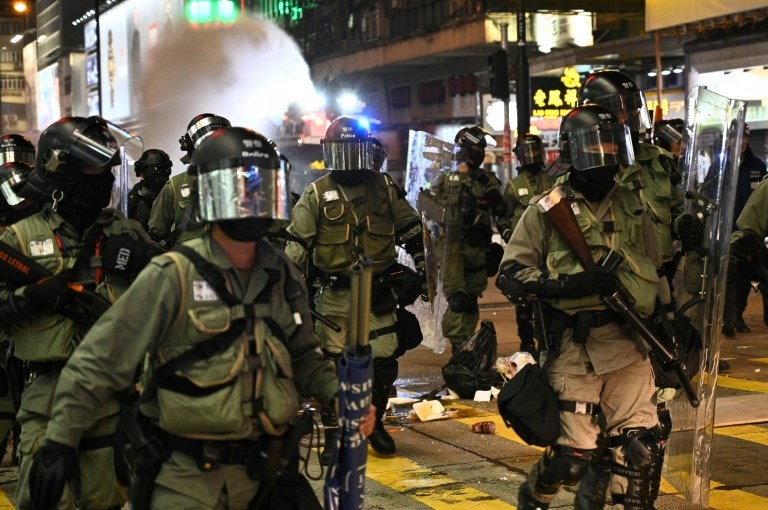Hong Kong's police watchdog is unequipped to investigate the force's handling of months of pro-democracy protests, a panel of international experts appointed by the city's own government has found.
The embarrassing verdict came as fresh unrest broke out on Sunday with activists and police clashing in multiple neighbourhoods after protesters held flashmob protests and vandalism sprees inside malls.
In one incident broadcast live on Now TV, an officer fired a tear gas canister from a moving police van at people who were heckling law enforcement from a pedestrian bridge in the district of Tsuen Wan.
The projectile struck a female reporter for the channel, leaving an angry welt on her arm.
A group of masked protesters also trashed a Chinese banquet restaurant run by a conglomerate that has been repeatedly targeted by activists because the owner's daughter has praised the police and Beijing.
Water cannon was used on Sunday evening against protesters who blocked roads in Mongkok district, which has seen frequent clashes.
Hong Kong has been upended by five months of huge and increasingly violent rallies, but Beijing has refused to give in to most of the movement's demands.
One of the core demands -- alongside fully free elections -- is an independent inquiry into the police, who have been left to battle protesters for 24 consecutive weeks and are now loathed by large chunks of the deeply polarised population.
City leader Carrie Lam has repeatedly dismissed an independent probe, saying the current watchdog -- the Independent Police Complaints Commission (IPCC) -- is up to the job.
Protesters argue the IPCC lacks adequate investigatory powers, is stacked with pro-establishment figures and has previously been toothless when it comes to holding the police to account.
- 'Shortfall' -
In September, the IPCC announced it had asked a panel of independent experts to provide advice.
Chaired by Sir Dennis O'Connor -- who was tasked by the UK government to look at police tactics following the 2011 London riots -- the panel includes policing specialists from Britain, New Zealand and Canada.
It has now issued a damning assessment of the IPCC's ability to investigate such a lengthy summer of unrest and suggested a fully independent inquiry would be better suited for the task.
The report, dated November 8, found "a shortfall in IPCC powers, capacity and independent investigative capability necessary to match the scale of events and the standards required of an international police watchdog operating in a city that values freedoms and rights".
The panel said if resources were enhanced, the IPCC might be able to issue an interim report "with limited, but sufficient facts" on the cause of the protests and the handling by authorities.
But it also said there was "a compelling case" for a "deeper more comprehensive inquiry... by an independent body with requisite powers".
The report was not available on the IPCC's website.
But it was posted on Twitter late Saturday by one of the panel members, UK-based academic Clifford Stott.
The Hong Kong government declined to address the findings directly but said the IPCC should be given time to do its investigation.
- 'Damning' statement -
The panel's conclusion is an embarrassment for Lam as she battles record-low approval ratings and tries to face down calls for an independent inquiry.
"For them to come out with a statement effectively saying that IPCC is not up to the task is quite damning and only reinforces the urgency of an independent inquiry," Antony Dapiran, a Hong Kong-based lawyer who wrote a book about the city's pro-democracy movement, told AFP.
Beijing and Lam appear determined to wait out the protests and have shown little appetite for any further compromises.
Over the weekend a senior party official in Beijing called for Hong Kong to implement tough national security laws -- an issue that sparked massive protests in 2003.
While crowd numbers are smaller than earlier this summer when millions marched, rallies and increasingly violent clashes are still a weekly occurrence.
Tensions soared this week when a 22-year-old student died from a fall during clashes with police in unclear and disputed circumstances.
Tens of thousands of people attended a peaceful vigil Saturday evening, one of the few large gatherings in recent months to be granted police permission.
Protesters have called for a general strike on Monday but it is unclear whether they will be able to muster enough numbers to create the kind of transport paralysis caused by widespread strikes in the summer.



